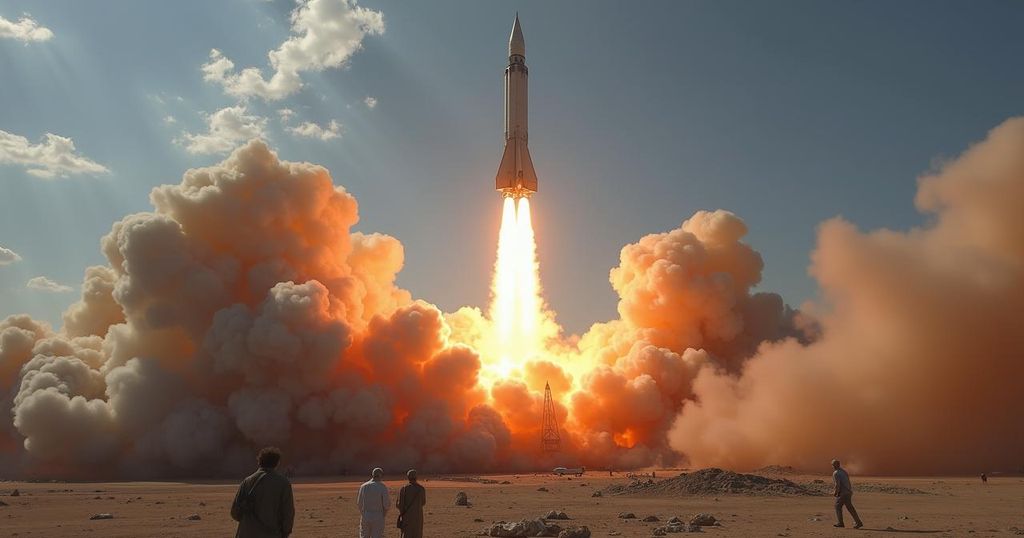Iran is extremely anxious as it anticipates Israel’s reaction to its missile attack. The U.S. is engaged in consultations with Israel, urging restraint regarding Iranian nuclear sites. Regional allies express concern over potential conflict escalation and its economic impacts. Iran seeks diplomatic support to mitigate Israeli retaliation while Gulf states refuse to allow their airspace to be used for any attack on Iran.
The Iranian government is currently facing significant anxiety as it awaits Israel’s impending response to a missile attack it launched earlier this month. Reports indicate that Iran is actively engaging in urgent diplomatic communications with various Middle Eastern nations in an effort to mitigate the potential scale of Israel’s retaliation. Should these efforts prove unsuccessful, Tehran is also seeking assistance in safeguarding itself against any aggressive actions from Israel. The United States is closely monitoring the situation, with officials consulting with Israel regarding its strategic response to Iran’s missile assault. U.S. President Joe Biden recently communicated with Israeli Prime Minister Benjamin Netanyahu, emphasizing that Israel’s retaliation should be “proportional.” Amid rising tensions, Gulf allies of the United States, including the United Arab Emirates, Bahrain, and Qatar, have voiced concerns regarding the potential consequences of an attack on Iranian oil facilities, highlighting possible economic and environmental repercussions for the entire region. There are profound concerns within the Biden administration regarding the escalating exchange of attacks between Iran and Israel. This conflict has been intensifying since Israel targeted what Iran claimed was its consulate in Damascus earlier this year, leading to fears that the confrontation may escalate into a wider regional conflict that could also involve the United States. Moreover, uncertainties surrounding the United States’ influence over Israel have increased, particularly as Israel has disregarded U.S. calls for restraint in its military operations in Lebanon, which have resulted in significant casualties. Reports indicate that Israel has conducted operations without prior consultation with the United States, further complicating the dynamics of this already fraught situation. As the Israeli security cabinet continues deliberations regarding the appropriate course of action, there remains skepticism about the level of transparency in these discussions with U.S. officials. Notably, as of the latest updates, Israel has not provided guarantees that it will refrain from targeting Iran’s nuclear infrastructure. The unfolding events have drawn warnings from Israeli officials, including Defense Minister Yoav Gallant, who stated, “Our strike will be powerful, precise, and above all – surprising,” indicating the potential seriousness of any Israeli military response. Despite the chaos created by these tensions, there is a collective desire among regional nations to avoid entanglement in the conflict. Saudi Arabia and the United Arab Emirates have made it clear that they will not permit Israeli operations to be launched from their territories, while Jordan has declared its intent to safeguard its airspace from unauthorized incursions. The United States believes that Iran is likely not seeking a full-scale war with Israel, as indicated by Iranian Foreign Minister Abbas Araghchi’s remarks reflecting internal viewpoints within Iran regarding the desirability of conflict. The Biden administration has also urged Iran to carefully calibrate its responses following any Israeli retaliatory actions, as the diplomatic backchannel communications continue.
The ongoing tensions between Iran and Israel have been exacerbated by recent missile exchanges, with Israel contemplating its response to an Iranian military strike that occurred earlier this month. This situation highlights the fragile geopolitical landscape of the Middle East, as nations attempt to navigate their interests amidst growing concerns of a wider regional conflict. The U.S. is particularly involved, weighing its historical alliance with Israel against the need to prevent escalation that could draw American involvement. This context is significant for understanding the urgent diplomatic maneuvers being undertaken by Iran and its regional partners as they seek to avoid military confrontation and maintain stability in the region.
In summary, tensions between Iran and Israel are at a critical juncture as both nations prepare for the potential fallout from recent military engagements. The Iranian government is acutely aware of the possible repercussions of an Israeli response to its missile attack, prompting urgent diplomatic initiatives to mitigate aggression. The involvement of the United States highlights the complexities of the situation, as Washington seeks to balance its longstanding support for Israel with the necessity of preventing broader regional conflicts. The evolving dynamics are closely monitored worldwide, and all eyes are on Israel’s subsequent actions as the situation develops.
Original Source: www.cnn.com






